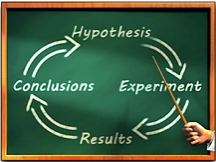Observation is a passive science, experimentation an active science.
- Claude Bernard

Christianity is a cooperative effort of relationship building between sinful men and God’s Holy Spirit. With the inspiration and direction of Scripture as a framework, believers are not only encouraged but commanded to develop spiritually in service to God and their fellow man.
Too often a neglected area of study, learning the language of the Spirit by first rightly remembering, interpreting and implementing Scripture, and becoming sensitive to His leading, is the privilege and responsibility of every Christian. As is maturing in faith to the point of experiencing the fullness of the Fruit and Gifts of the Spirit.
Those caring enough to work through the more obvious differences between faith and presumption avoid many a pitfall. Yet such success represents only half of living faith’s journey. As individuals and families succumb to modern life’s ubiquitous levels of temptation and deception, serious and caring Christians are continually faced with the glaring need for real and lasting renewal, revival or even reformation. Modern Christianity’s mistaken message of “peace peace when there is no peace” notwithstanding, judgment is at the door with the stage all but set for the Great Tribulation. These and other unfortunate circumstances ensure those sensitive to the Spirit are daily vexed with mankind’s desperate need for pre-revival repentance paving the way for a genuine and global new Pentecost with thousands, if not a million, upper rooms.
Unfortunately, even among this remnant of the remnant, the kind of spiritual sensitivity necessary for such an undertaking can prove elusive. While clearly recorded and offered in the New Testament, Churchianity is off-line with the best of us receiving spotty signals at best. So much so, many if not most churches are hesitant to initiate or even support efforts to genuinely develop the gifts of the Spirit, such as miraculously healing the sick. Even charismatics find honest research too messy. Failures and limited successes generate difficult and unwanted questions regarding the status quo.
King Solomon notes a similar refrain in the first chapter of Ecclesiastes. “For in much wisdom is much grief, and he who increases knowledge increases sorrow.” Yet, one wonders which road leads to greater grief and sorrow? The difficulties inherent in walking towards or away from God? Millions if not billions of believers have and continue to straddle the fence, hoping for the best of both worlds. While often seeming to work for a season, Scripture warns we simply can’t serve two masters:
- “You can’t worship two gods at once. Loving one god, you’ll end up hating the other. Adoration of one feeds contempt for the other…” Matthew 6:24 The Message
- “For if we would judge ourselves, we would not be judged. But when we are judged, we are chastened by the Lord, that we may not be condemned with the world.” 1 Corinthians 11:31-12 NKJV
- “But the spiritual man tries all things [he examines, investigates, inquires into, questions, and discerns all things], yet is himself to be put on trial and judged by no one [he can read the meaning of everything, but no one can properly discern or appraise or get an insight into him]. For who has known or understood the mind (the counsels and purposes) of the Lord so as to guide and instruct Him and give Him knowledge? But we have the mind of Christ (the Messiah) and do hold the thoughts (feelings and purposes) of His heart.” 1 Corinthians 2:15-16 Amplified Bible
- “Concerning this we have much to say which is hard to explain, since you have become dull in your [spiritual] hearing and sluggish [even [f]slothful in achieving spiritual insight]. For even though by this time you ought to be teaching others, you actually need someone to teach you over again the very first principles of God’s Word. You have come to need milk, not solid food. For everyone who continues to feed on milk is obviously inexperienced and unskilled in the doctrine of righteousness (of conformity to the divine will in purpose, thought, and action), for he is a mere infant [not able to talk yet]! But solid food is for full-grown men, for those whose senses and mental faculties are trained by practice to discriminate and distinguish between what is morally good and noble and what is evil and contrary either to divine or human law.” Hebrews 5:11-14 Amplified Bible
So how best is spiritual discernment practiced? One obvious answer is learning to distinguish God’s voice from that of the flesh or worse. Another is to set our sites on developing the fruit and gifts of the Spirit. Both these lofty and admirable goals require much effort and no small amount of grief. Paul uses the diligence of athletes, farmers and soldiers to exemplify the kind of commitment and lifestyle necessary for spiritual advancement:
- “You’ve all been to the stadium and seen the athletes race. Everyone runs; one wins. Run to win. All good athletes train hard. They do it for a gold medal that tarnishes and fades. You’re after one that’s gold eternally. I don’t know about you, but I’m running hard for the finish line. I’m giving it everything I’ve got. No sloppy living for me! I’m staying alert and in top condition. I’m not going to get caught napping, telling everyone else all about it and then missing out myself.” 1 Corinthians 9:24-27 The Message
- “When the going gets rough, take it on the chin with the rest of us, the way Jesus did. A soldier on duty doesn’t get caught up in making deals at the marketplace. He concentrates on carrying out orders. An athlete who refuses to play by the rules will never get anywhere. It’s the diligent farmer who gets the produce. Think it over. God will make it all plain.” 2 Timothy 2:6-7 The Message
Diligently Seek Him
Spiritual lessons to be learned from the athlete, farmer and soldier analogies are all but endless. For our purposes the following will suffice: How might we rank the diligence level of these three examples?
1. Soldier: Failure may mean immediate death for himself and/or platoon.
2. Farmer: Failure may mean future bankruptcy.
3. Athlete: Failure by a professional athlete could jeopardize his/her’s financial future. Failure by an amateur athlete simply means forfeiting recognition.
In the case of an amateur athlete, the least diligent of the examples, how many hours a week might they ”practice” to become proficient in their sport? Note: The average high school football player invests 15 - 20 hours a week during the season.
A few minutes of meditating on Paul’s examples of diligence make it clear that those wishing to move from milk to the meat of the full gospel, in hopes of pressing on into spiritual maturity, need to invest at least the time and energy of a high school athlete:
- “Therefore let us go on and get past the elementary stage in the teachings and doctrine of Christ (the Messiah), advancing steadily toward the completeness and perfection that belong to spiritual maturity. Let us not again be laying the foundation of repentance and abandonment of dead works (dead formalism) and of the faith [by which you turned] to God. With teachings about purifying, the laying on of hands, the resurrection from the dead, and eternal judgment and punishment. [These are all matters of which you should have been fully aware long, long ago.] If indeed God permits, we will [now] proceed [to advanced teaching].” Hebrews 6:1-3 Amplified Bible
- “But you are the ones chosen by God, chosen for the high calling of priestly work, chosen to be a holy people, God’s instruments to do his work and speak out for him, to tell others of the night-and-day difference he made for you—from nothing to something, from rejected to accepted.” 1 Peter 2:9-10 The Message
- “And formed us into a kingdom (a royal race), priests to His God and Father—to Him be the glory and the power and the majesty and the dominion throughout the ages and forever and ever. Amen (so be it).” Revelation 1:6 Amplified Bible
What is most needed today are believers desiring to be the church rather than merely attend. Men and women willing to set aside at least some of the trappings and contrivances of modern life and 21st century Churchianity in pursuit of the transformation and power so prevalent in the 1st century. Believers following in footsteps of the sons of Issachar, understanding the times as well as the importance of restoring the presence and power, protection and provision of the Holy Spirit to every aspect of Christianity. Prophetic Christians, rooted enough in the faith that they can afford to heavily invest themselves in exploring the nuances of sensitivity to the Spirit of God. Honest yet hopeful researchers willing to do the hard work of experimentally discovering what does and doesn’t work and why, by employing aspects the time tested scientific method.
Authors Note:
For Prophetic Christians making headway in the kind of full on commitment required by radical disciples, Quantum Christianity suggest practicing daily waking in the fruit and gifts of the Spirit. Up to and including pursing mustard seed faith. QC also provides a layman's scientific research approach to experiencing and demonstrated the kind of ongoing miracles the New Testament assures should be part and parcel of the lifestyles of genuine New Creations in Christ in our article entitled "E=mc²"
More information
In the Red Dropdown Icon you'll find resources that we hope will both stimulate and facilitate your pursuit of and understanding of the God of the Bible. To get started simply place your cursor on a category of interest and see where it leads. You can also join the discussion in a variety of ways including posting comments to God Blogs as well as making comments or asking questions by email or text.
Copyright 2018 All Rights Reserved
